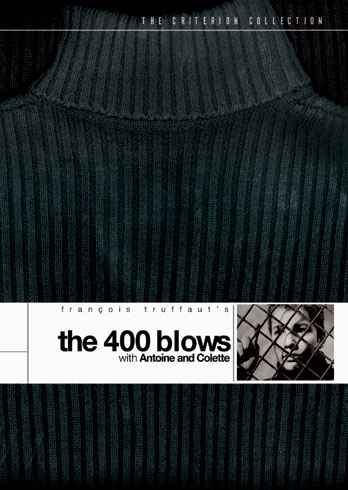Cinecultist doesn't know about you but we own a few DVDs that we've never watched. Mostly this comes from the lure of the Criterion collection — "our own personal collection would just not be complete without this title in it," we argue to ourself in the video store. The biggest offender is The Adventures of Antoine Doinel box set which CC purchased for ourselves as a graduation gift from cinema studies grad school over a year ago and has sat forlorn on the shelf since then. This week during the vacation from the Day Job, we've vowed to watch one film each day from the set and also to explore all of the extra features. It will be a daunting but enjoyable task — four full length feature films, two shorts dozens of made for television features, newsreel footage, promotional spots, trailers and then a 72 page booklet. It's like a mini-François Truffaut festival on our home DVD player.
 In the last few days we've done all of disk one, which includes the 400 Blows and the short film Antoine and Colette, read the relevant pages in the supplement book plus watched interviews with Jean-Pierre Léaud as a kid after the film screened at Cannes, a slightly older but still precocious Léaud at the release of L'amour à vingt ans, interviews with Truffie and Truffie's life long friend and inspiration for the character René, Robert Lachenay for French television. It's a cornucopia of Nouvelle Vague information and frankly, it has made Cinecultist a bit giddy. So much wonderful late '50s French goodness fills up the movie-viewing soul. It's the perfect antidote to the summer blockbuster malaise we've been edging into of late.
In the last few days we've done all of disk one, which includes the 400 Blows and the short film Antoine and Colette, read the relevant pages in the supplement book plus watched interviews with Jean-Pierre Léaud as a kid after the film screened at Cannes, a slightly older but still precocious Léaud at the release of L'amour à vingt ans, interviews with Truffie and Truffie's life long friend and inspiration for the character René, Robert Lachenay for French television. It's a cornucopia of Nouvelle Vague information and frankly, it has made Cinecultist a bit giddy. So much wonderful late '50s French goodness fills up the movie-viewing soul. It's the perfect antidote to the summer blockbuster malaise we've been edging into of late.
Antoine Doinel is the character Léaud plays in this series of Truffaut films starting when he was 14 through his 30s and his fictional experiences are a sort of composite of Truffaut and Léaud's lives. The 400 Blows (1959) in particular details a number of Truffaut's biographical details from his difficult childhood including being sent to reform school by the police. Léaud then contributed his own dialogue phrasing to these events, as Truffaut would dictate the scenario, some of the blocking and the camera placement but leave the actors to improvise the words. Everyone comments on and it really is remarkable, the freshness and immediacy Léaud brings to Doinel. What an amazing thing to really get to see a young person grow up on screen. It's the most natural thing in the world, maturing to adulthood and falling in love, but it is so rarely captured in such a singular way as Truffaut does here.
After seeing Antoine and Colette, CC is now anxious to watch the rest of L'amour à vingt ans (1962), an omnibus Truffaut contributed to which has five short films about love at 20 from five different countries. It's easy to see how much Bertollucci borrowed from this 30 minute short, what with the young lovers meeting at a concert, the depiction of an insular Parisian family life, the production design of a romantic young man's hotel room apartment, and even the two shot using a mirror. Colette stands in the doorway and tells Antoine lounging in bed, who we see reflected in a mirror next to her, that doesn't want to continue their relationship. Shades of the Dreamers, anyone?
Stay tuned for our impressions of Stolen Kisses, wherein Doinel becomes a private detective and has a series of misadventures (according to the back of the DVD). We'll also probably be compelled to rhapsodize about Henri Langlois because the extras on disc two feature him very prominently.
Posted by karen at July 7, 2004 10:34 AM